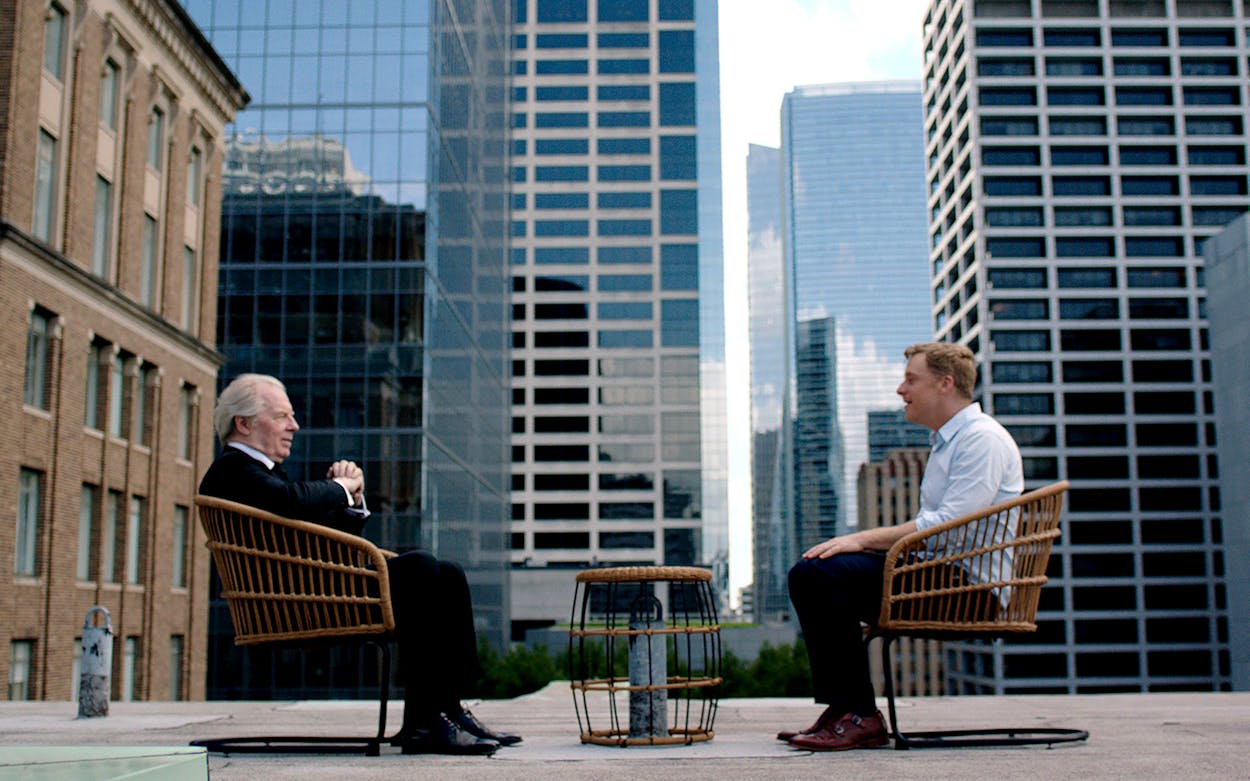Think of all the times you’ve seen Houston depicted on screen. The elite prep schools of Rushmore and the Pasadena honky-tonks of Urban Cowboy. The posh River Oaks mansions of Terms of Endearment and the grungy Montrose apartments of Reality Bites. The jewel of the Astrodome, glinting in the bustling center of Brewster McCloud, and the tricked-out slabs drifting lazily through South Park streets in the video for Mike Jones’s “Still Tippin’.” Houston is such an enormous city, filled with so many overlapping contrasts, that it’s little wonder filmmakers have only managed to capture it in pieces. And even after a half century of starring roles, in which the city’s played host to everyone from John Travolta to RoboCop, Houston’s never looked quite the way it does in Playing God.
Arriving in theaters and on demand August 6, Playing God paints Houston as a vibrant metropolis teeming with money and mystery. Writer-director Scott Brignac’s debut feature shows off some of his hometown’s more idiosyncratic landmarks: the late, lamented rock club Fitzgerald’s; the eighties time capsule that is Dairy Ashford Roller Rink; the “Be Someone” graffiti on the railroad bridge overlooking Interstate 45. But arguably, he does an even more impressive job of making Houston look anonymous—a sleek, urban nerve center that argues for Texas’s biggest metropolis as an alternative to those played-out cityscapes movies are always returning to in New York, Los Angeles, and Chicago. As the film’s characters wend their way through a gleaming downtown aboard the neon-streaked METRORail, or gaze across the rooftops of so many imposingly glassy skyscrapers, Playing God revels in the city’s industrial heft. The film often evokes a sunbaked spin on Michael Mann’s 1981 thriller Thief, giving Houston a similar noirish intrigue beneath those wide Texas skies.
This setting proves to be a fitting backdrop for Playing God’s own crime story, which revolves around twins Rachel (Hannah Kasulka) and Micah (Luke Benward), former child orphans turned scrappy, self-reliant con artists. The brother-sister duo pulls off scams of varying levels of sophistication, from organizing fake charities to simple pickpocketing. But after a run-in with a menacing gangster (Ozark’s Marc Menchaca) to whom Micah owes money, they’re forced to go after their biggest score yet: robbing Ben, a tech billionaire played by El Paso’s own Alan Tudyk. Ben is also an off-the-grid recluse in the middle of a spiritual crisis, having recently traveled the world in a desperate, jaded search for God. Exploiting his vulnerability, Rachel and Micah set out to convince Ben that they’re God’s personal envoys, sent to arrange a one-on-one with the deity himself. They recruit their old mentor, Frank (Michael McKean), to play the part, all of them aiming to win Ben’s trust until they can make off with his fortune.
For a little while, at least, Playing God has fun just rolling with its outlandish conceit. McKean clearly relishes the handful of scenes where he gets to wax biblical, hamming it up with some portentous sermonizing and a few parlor-trick miracles. Brignac brings a zippy energy to the early moments when the scheme is set in motion, giving these scenes an Ocean’s Eleven swagger. But this playfulness soon proves to be its own misdirect: Playing God is a movie suffused with sadness, one where nearly every character has a tragic backstory. Ben is grieving the death of his young daughter, and he wants God to answer for taking her. Rachel and Micah are still working through their traumas from being abandoned as children. Almost immediately, they realize that their con job is less clever than downright cruel. And from then on, Playing God becomes a much different, far more somber story.
This leaves the film in an awkward position. Is it a quirky, high-concept caper? Or is it a wrenching drama about suffering and betrayal? Playing God strives to be both, but ultimately it struggles to balance offbeat comedy with its more philosophical ambitions. After that initial rush of watching the trio’s scheme fall into place and Frank dazzle Ben with his faux-divine act, Playing God yields most of its running time to making sure we feel really, really bad. Rachel becomes wracked with guilt, while Micah’s scheming takes an unexpected sadistic turn. And although McKean manages a few laughs, often just by virtue of his delivery, Tudyk is consigned to spend every scene playing varying degrees of haunted and hollowed-out—a shame for such an appealingly funny actor. The arrival of some obligatory plot twists attempts to revive some of that rollicking, heist-movie energy, but they also end up compounding the overwhelming sense of melancholy and sourness. In the end, Playing God winds up feeling a bit lost itself, uncertain exactly what it wants to be.
Fortunately, Brignac the writer is well served by Brignac the director, and he makes up for any unevenness in his script with a remarkably self-assured visual style. His camera soars fluidly through Houston’s downtown, arcing up and over its iconic skyline, and often swooping down from directly above, like an omnipotent eye. One impressive shot in particular—looking down on Tudyk as he sprawls on a huge lawn, surrounded by dozens of arcing sprinklers—already feels like a visual signature that’s just waiting to be expanded on, in whatever Brignac tackles in the wake of such a confident debut. There’s definitely a lot of potential to be found in Playing God—both for Brignac’s future in film, and for Houston’s.






